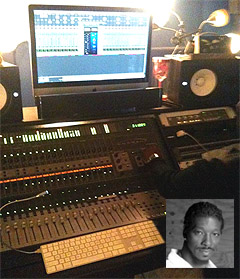|
Recording - Vocals - Studio or Home Recording -
Mics - Software and Hardware
These days, there are a lot of people
that can "get around" in their home studio, or particular software-based, or hardware digital environment enough
to record their music, and also make their interpretation of a record mix. But, this doesn't necessarily mean that they can
make the sound of everything being recorded and mixed as competitive as it most likely needs to be. This is especially true
when it comes to recording vocals, or live instruments where understanding microphones, mic placement, pre-amps, and compressors
come into play. Hey, many of us can drive a car, but few of us can compete in a professional racing event against professional
racecar drivers. Please keep in mind that if you are making a recording that you are planning to release for sale into the
marketplace, the particular recording you're making may have to compete with records by Beyoncé, Maroon 5, Taylor Swift,
Adele, Kirk Franklin, Kanye West, and other great artists releasing music projects. Most times, seasoned professionals - the
best in the business, work these artist's recordings.
I once remember being in the studio with engineer Alvin
Speights, and an up-and-coming producer asked Alvin what was his preference as far as audio software and hardware - to make
his final mixes come out sounding so good. Alvin simply replied, "Well, using Pro Tools makes everything easier, but
as far as what the mix will actually sound like - that will be more determined by the way I hear things, and the way I know
how to get the sounds I want to hear to come out in the mix. Pro Tools, or whatever audio software or hardware will not dictate
and control how good the mix comes out; I will be in control of the mix. Now, it might take me longer to do the mix if I don't
have all of the new toys and tools, but basically, I will try to make the sound of the mix good on whatever I am working with."

What Alvin is saying is that in the end - overall, what
the finished mix will sound like is just the way he wants to "hear it". He will always try to find a way to get
the sound he is trying to get with whatever tools are available, as long as the tools are workable and to some extent quality.
Of course having Pro Tools, Logic, and/or a vast selection of digital plug-ins, and other software/hardware options at his
disposal gives him a way to set sounds, balance, edit and recall everything a lot easier and faster. But, first and foremost,
Alvin's engineering experience, skills, ears, ingenuity, and know-how will be the main things that come into play to make
everything sound great.
When you are at that part of a music project where you're
needing vocals recorded, or possibly live instruments, or even if you need someone that knows how to troubleshoot something
that's not working out right, it becomes very important to have a competent person working with you. Imagine if you're recording
vocals on a singer, and the singer is doing a great performance, but you or the person recording doesn't understand how to
use a compressor, or understand microphones, or mic placement, or pre-amps, and you keep getting distortion or "compressor
pumping/breathing" in some parts of the audio, well - you might end up not being able to keep that great vocal performance
because the person doing the recording didn't capture the vocals correctly, which isn't a good thing. There are some people
that also believe that they can just "slap" a preset plug-in across their audio track to fix it, and that will make
everything sound wonderful, but that's not always the correct "fix".
I have been involved in projects where a lot of money
was being spent, and mistakenly trusted the so-called expertise of an engineer. I did not get favorable, or what I even consider
professional results...and definitely not close to what I expected. Why? Because the people running the studio and their technical
knowledge and understanding of everything they needed to know to get great results was not up to par. I'm talking about problems
like vocal clipping in too many places, bad compressor settings while recording vocals, sibilance problems, audio level inconsistency, latency and timing problems for the singer with the headphone mix to hear themselves, bad punches, and also tracks with FX getting
"printed" to audio tracks. Also, it can be a problem if some of the people that are involved with the recording
process are using illegal or "cracked" software...that may work fine in their own studio, but when you get the session
files to a legitimate studio or set-up where everything is genuine, your song may not "pull up" correctly. Actually,
some of the plug-ins and audio settings may not pull up at all. This can be a nightmare for you, your music, and your project.
It can also end up being very expensive to fix. So please consider that the know-how, experience and expertise of using someone
competent to engineer your music project can be very important if you plan on keeping the tracks for release later on. It's
best to be ready-and-able, which means producers and engineers need to be prepared to "catch" or capture the artist's
performances, especially in the early stage of recording studio vocals, because many times that's when the "takes"
seem to have the most feeling and emotion.
Recording Vocals Part 2 >>>
If you find the site helpful - please
consider visiting the sponsored ads - thank you. |
|

